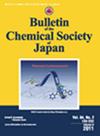冷冻浓缩层作为水凝胶形成的独特领域
IF 3.8
3区 化学
Q2 CHEMISTRY, MULTIDISCIPLINARY
引用次数: 0
摘要
冰晶、溶质和结合水在冻结过程中的相分离可以作为控制水凝胶分层结构的反应场。本文研究了采用固-准液相分离制备羧甲基纤维素纳米纤维水凝胶。只需将柠檬酸加入冷冻的CMCF中并将混合物解冻即可形成CMCF水凝胶。冷冻交联CMCF水凝胶的抗压强度比常规交联方法制备的CMCF水凝胶高20万倍。研究发现,在冰晶融化前,CMCF结构通过氢键重排发生在冻结浓度层。在冷冻浓度下,CMCF和结合水在高浓度下被限制。在这样一个独特的空间内进行交联反应,形成了具有高机械强度的CMCF水凝胶。讨论了冷冻交联CMCF水凝胶的凝胶行为和性质及其应用。冰晶、溶质和结合水在冻结过程中发生的相分离可以作为反应场形成结构有序的水凝胶。研究了采用固-准液相分离法制备高机械强度的冷冻交联羧甲基纤维素纳米纤维水凝胶。本文章由计算机程序翻译,如有差异,请以英文原文为准。
Freeze-Concentrated Layers as a Unique Field for the Formation of Hydrogels
The phase separation of ice crystals and solutes and bound water that occurs during freezing can be used as a reaction field to control a hierarchical structure of hydrogels. Here, we present a study of carboxymethyl cellulose nanofiber (CMCF) hydrogels formed using solid-quasi liquid phase separation. CMCF hydrogels were formed simply by adding citric acid to frozen CMCF and thawing the mixture. The compressive strength of the freeze crosslinked CMCF was 200,000 times higher than that of CMCF hydrogel formed by a conventional crosslinking method. It was found that rearrangement of CMCF structures via hydrogen bonding proceeds in the freeze concentration layer before the ice crystals melt. Under freeze concentration, CMCF and bound water are confined at high concentrations. The crosslinking reaction in such a unique space contributed to the formation of CMCF hydrogel with high mechanical strength. We discuss the gelation behavior and properties of freeze crosslinked CMCF hydrogels and their applications. The phase separation of ice crystals and solutes and bound water that occurs during freezing can be used as a reaction field to form structurally ordered hydrogels. This paper presents a study of freeze-crosslinked carboxymethyl cellulose nanofiber (CMCF) hydrogels with high mechanical strength formed using the solid-quasi liquid phase separation.
求助全文
通过发布文献求助,成功后即可免费获取论文全文。
去求助
来源期刊
CiteScore
6.40
自引率
5.00%
发文量
194
审稿时长
3-8 weeks
期刊介绍:
The Bulletin of the Chemical Society of Japan (BCSJ) is devoted to the publication of scientific research papers in the fields of Theoretical and Physical Chemistry, Analytical and Inorganic Chemistry, Organic and Biological Chemistry, and Applied and Materials Chemistry. BCSJ appears as a monthly journal online and in advance with three kinds of papers (Accounts, Articles, and Short Articles) describing original research. The purpose of BCSJ is to select and publish the most important papers with the broadest significance to the chemistry community in general. The Chemical Society of Japan hopes all visitors will notice the usefulness of our journal and the abundance of topics, and welcomes more submissions from scientists all over the world.

 求助内容:
求助内容: 应助结果提醒方式:
应助结果提醒方式:


